A couple of weeks ago, we mentioned that New Zealand evangelist Ray Comfort was about to release an anti-gay film called Audacity.
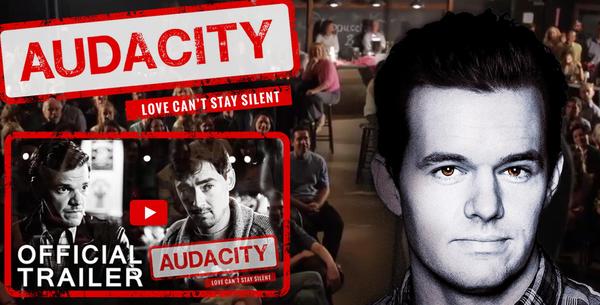
Well, I watched it a few hours after the Supreme Court legalized marriage equality nationwide.
It was an emotional day; my colleagues at the LGBT nonprofit where I work stood in a circle and cried together, my girlfriend and I sent heartwarming news clips back and forth, and I left work early to hang out at the Stonewall Inn and high-five other people who were overcome with joy at the news.
And I capped off my day with Audacity, which all about the lifework of Christians to “save” doomed LGBT people like me. It did absolutely nothing to sully my euphoria from the morning’s victory, but it did give me serious pause about what actually goes on in the brains of Christian civil rights opponents around me.
In case you’re actually planning to watch the film — and, in that case, I recommend splitting the $19.99 price tag with 20 of your closest friends and throwing a heathens-only viewing party — my thoughts below are laden with spoilers.
Our protagonist in the film is Peter, a nervous bicycle delivery guy probably in his early 20s, who sometimes struggles in social situations because people shudder when he tells them he’s a Christian. Every time he “comes out” to a new person, he’s met with questions like “Oh… so do you actually believe that stuff?” and “Don’t most Christians think gays are going to hell?”
This “hostility” comes primarily from our other protagonist, Diana, although some of it is exaggerated in Peter’s mind. Toward the beginning of the film, Peter has a dream about chit-chatting with Diana when it comes up that she has a gay sister. As soon as Peter tells Diana he’s a Christian, she sticks up for her sister, telling Peter about how hard she’s had it and furious that “You have the audacity to tell me she’s going to hell. Go ahead, say it.” Peter is uncomfortable and leaves.
On his way to work (still dreaming), he encounters two giddy young women in an elevator who tell him they’re about to get a marriage license. He starts to reach for his Bible in his pocket and then thinks better of it.
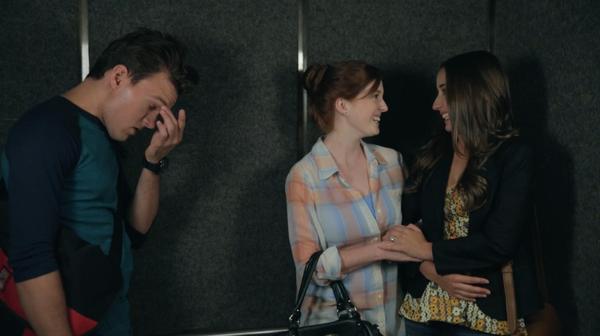
When they exit the elevator and he tries to leave for his floor, the elevator drops and lurches to a halt between two floors with the doors stuck halfway. He calls the operator, breaks through the doors, and has to climb out, but the operator orders him to stay right there and prevent anyone else from coming in, because “If anybody gets on this elevator, they’re gonna die!” For real.
But Peter has to rush to drop something off at work. So he scribbles a “DANGER!” sign on a piece of paper and sticks it on the elevator doors with his gum, before asking a snooty-looking man nearby to watch it for him. That man, who was seen earlier glaring at the two women, hears their homosexual happiness off in the distance and sneakily takes the paper off the door.
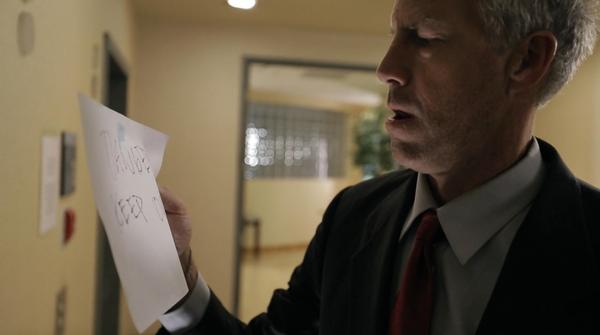
Oh, no! Now, nobody knows the elevator is a death trap! The women come back and push the elevator button. The snooty man does nothing. Peter comes running back as they get in the elevator, but he’s too late! We hear a crash, then screams, and we assume they have fallen to their death.
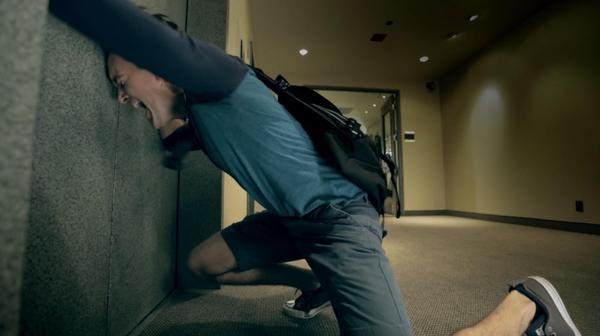
Suddenly, Peter wakes up. Phew. Nobody is dead. But Peter realizes the symbolic value of his dream — if you don’t warn the homosexuals about their deviance, they will fall down an elevator shaft. He Googles “how to witness to a homosexual.”
This is where Ray Comfort comes in.

He shows a series of real, unscripted interviews that he conducted with random LGBT people and allies on the street. In these manipulative, cringeworthy clips, he tricks people into saying that being gay is a choice through a series of faulty comparisons and leading questions.
It’s a little hard to follow because he jumps back and forth between people, but the basic conversation goes like this:
Ray Comfort: “Do you believe being gay is a choice? Do you think people are born that way?”
Innocent Bystander: “I don’t think it’s a choice. I think we’re born that way.”
RC: “What about adultery and fornication? Do you think we’re born with that instinct?”
IB: “Uh. Sure, I guess that’s human nature.”
RC: “But even if it’s human nature, we don’t act on that, because we know it’s bad.”
IB: “I guess.”
RC: “People are born with a nature that does what they want to do instead of what God wants.”
IB: “I guess.”
RC: “So now do you think being gay is a choice?”
IB: “Yeah, I guess it is.”
That’s his entire framework.
With a camera in your face and a stranger suggesting that you’re going to hell, it’s kind of hard to argue for yourself; most people would get nervous in that sort of situation. But Comfort has a particular methodology in his interrogations. Because he’s laying out “sins” in a step-by-step way, the flustered bystander can’t always think quickly enough to counter his points. It’s like when a canvasser stops and asks if you have a minute to spare for the environment. I mean, technically I do, but I don’t have the $12 a month you want, and I can’t say that to you right away!
Back to the movie.
The next time Peter sees Diana, he asks if she has a gay sister, and she says no. (Dodged that bullet!) But he still asks her to watch some videos to try to understand his point of view. She isn’t into it.
Diana: I’d rather not. Those people are so condescending.
Peter: Most Christians aren’t like that!
Diana: The Bible says a lot of things, like that God sends gays to hell.
Peter: You don’t get it, he wants to save you!
They bicker. It’s kind of cute. Before Peter leaves, Diana tearfully asks him a favor. Her brother is dying of cancer and she is angry at God. She wants Peter to tell her why it happened, and he says he’ll pray on it.

New scene! We flash to a convenience store, where a rude, young, straight couple is being obnoxious toward a young gay couple. Suddenly, a man pulls out a gun, tells everyone to drop to the floor, and demands all the cash from the register. In a weird moment of comedic relief, the clerk shouts, “Nobody pays with cash anymore!”
The gunman takes turns pointing the gun at different people’s heads until Peter (who happens to be in the store) shouts at him that he’ll have to answer to God. Then he volunteers to take the bullet: “If you’re going to shoot someone, shoot me!”
The gunman considers it, but then grabs the girl from the straight couple and drags her out of the store with his gun to her head. The police have shown up. He won’t let her go!
That’s when Peter saves the day: He eyes a can of spinach in the store, walks up being the gunman, and clocks him in the head with it.
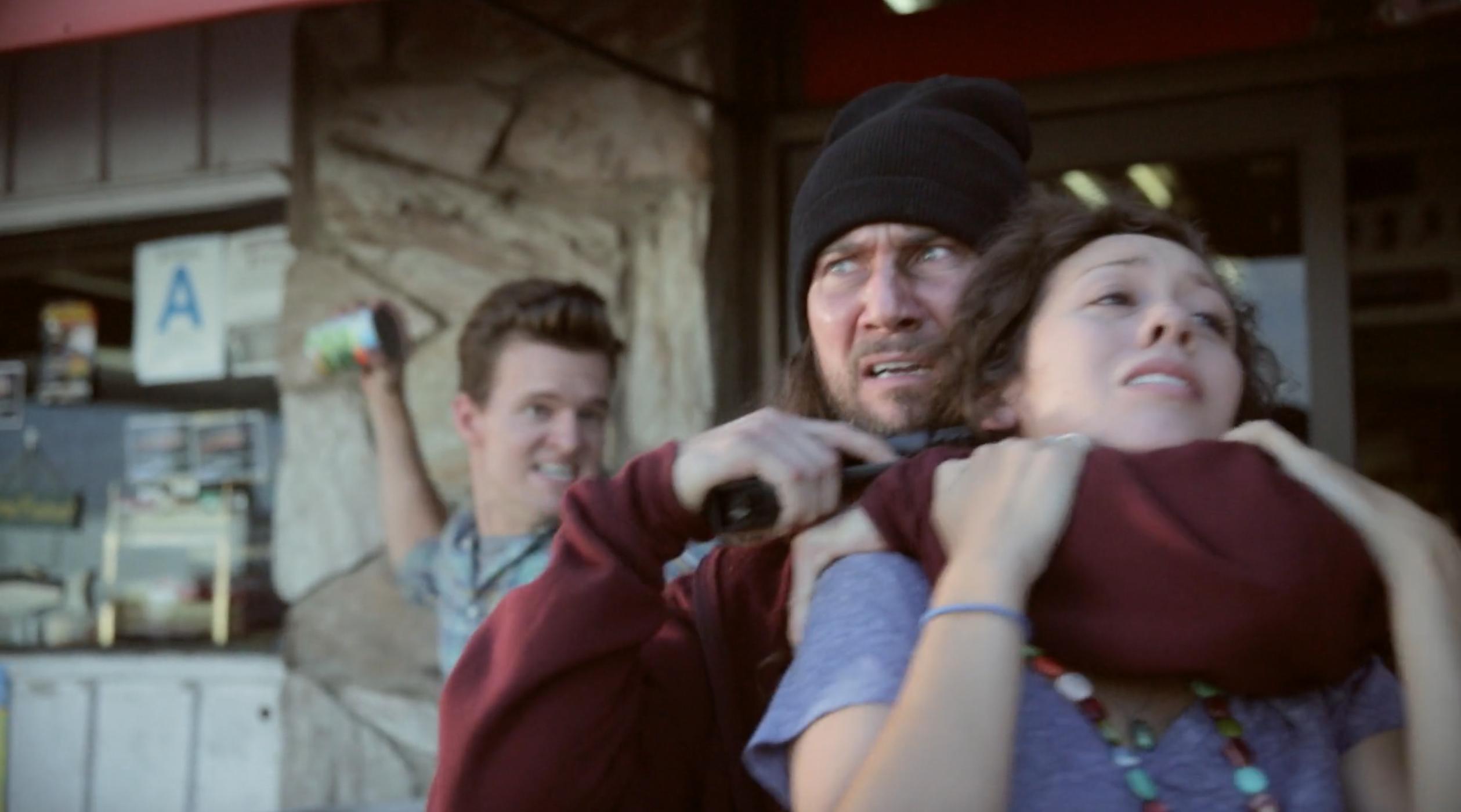
Peter is a hero, and he takes a series of selfies as the gunman sits in the police car. (I am not making that up.)
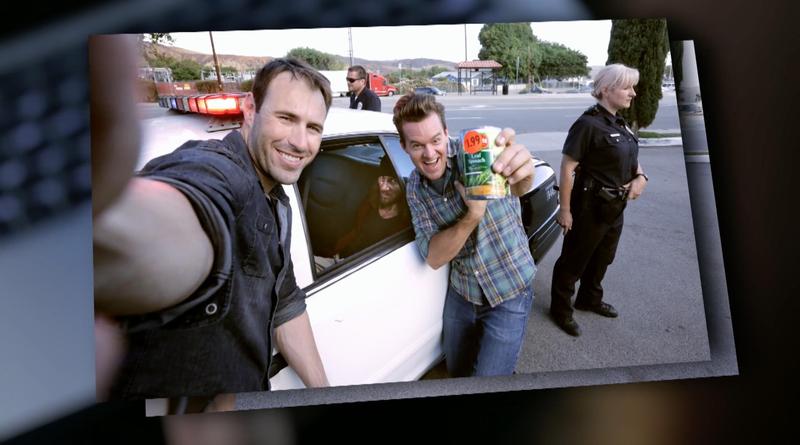
Now, we’re back to Diana, who is watching more videos featuring Ray Comfort. This time, he’s manipulating people into saying they are hell-bound sinners who need to repent. Again, it’s a mishmash of phrasing and conversations, but here’s how most of them happen:
Ray Comfort: Do you think you’re a good person? Do you think you’ll go to heaven?
Innocent Bystander: I think of myself as a good person. I think I’ll go to heaven.
RC: Well, are you sure about that? Do you know what the Ten Commandments say? Let’s look at them. Have you ever lied?
IB: Yeah, I’ve lied.
RC: You have. And have you ever stolen anything, even something of inconsequential value?
IB: Probably once in my life, sure.
RC: Have you ever looked at a woman with lust?
IB: Lol. Yeah. Totally. [One guy said, “I’m gay, so no,” so Comfort had to change his phrasing. It was great.]
RC: Okay, so now do you think you’d go to heaven?
IB: Hmm. You’re right. I’d probably go to hell. Uh oh.
It’s a series of questions Comfort and his frequent partner-in-crime Kirk Cameron have been asking for years.
Comfort compares repenting to paying a fine for a crime you’ve committed:
“This person is guilty, but their fine is paid, so they’re out of here.”
And when someone tells him they go to church, he says that’s not enough:
“Repent and trust alone in him. It’s like you trust a parachute. When you jump out of a plane, you don’t save yourself by flapping your arms.”
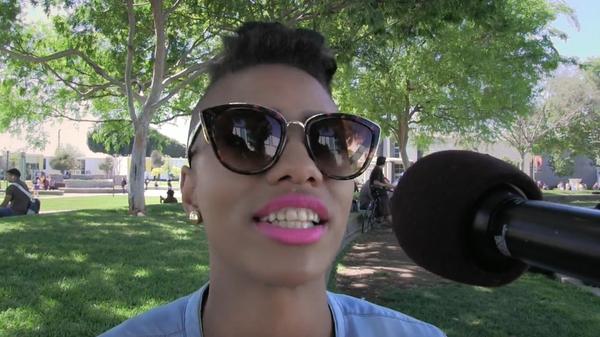
Oof. What a ride. I don’t know why these people didn’t just walk away; I guess we’re a polite bunch.
Back to our stoic protagonist. The gay couple from the convenience store wants to take Peter out for dinner as a thank-you for what he did, but things turn sour over drinks when he mentions he was compelled to save the day because he’s a Christian. One of the men grills him about the Bible condemning shellfish, the word “homosexuality” being a recent addition to the Bible, etc. Peter produces more pamphlets and defends himself.
“The bottom line is that I believe the Bible. Even though I’m terrified to do it, I have to speak the truth, no matter what people think of me. It’s not even about me, it’s about this wonderful living God.”
Here’s more of this tired rhetoric: that Christians are the ones being oppressed. That it is harder to be a vocal anti-gay Christian than it is to be gay. Hearing this, the more agitated man leaves in a huff, while the other guy actually sticks around to talk more with Peter about Christianity. It’s weird.
Cut to a conversation between Diana and Peter at a comedy club. Diana says that she heard about what happened and she “actually prayed… I can’t remember the last time I did that.” She’s been watching the videos all day. It makes sense to her now. She’s starting to come around.
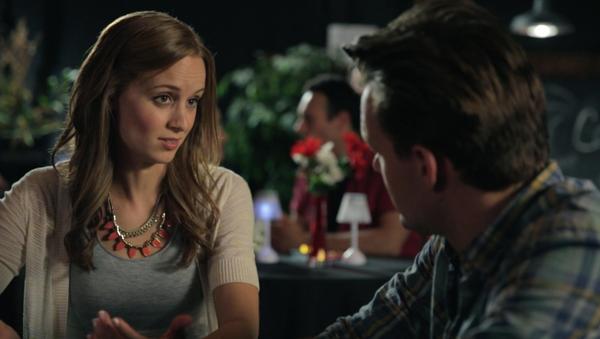
Suddenly Diana gets an urgent call about her brother in the hospital and she has to leave. On the road in the pitch-black night, she runs out of gas. Stuck and emotional, she calls Peter and leaves him a message. We only hear a bit of it, but basically, she’s been thinking a lot about this Jesus stuff and she wants to talk about it even more. I’m not sure why she didn’t open with “Help, I’m stuck on the highway in the middle of the night with no gas,” but to each their own.
That’s when the scariest non-witnessing part of the movie happens. A giant, red-faced man starts banging on Diana’s car window and yelling. We can’t make out the words, but Diana is screaming, understandably, as she is stuck and a man is presumably going to assault her in her car. The man backs up, punches through her window, and grabs her. What’s happening?! We’re terrified for Diana! He starts to pull her out of the car, and then we see what’s up: She was stopped on train tracks, and he was pulling her out of the way of an oncoming train. Do you smell the metaphor coming?
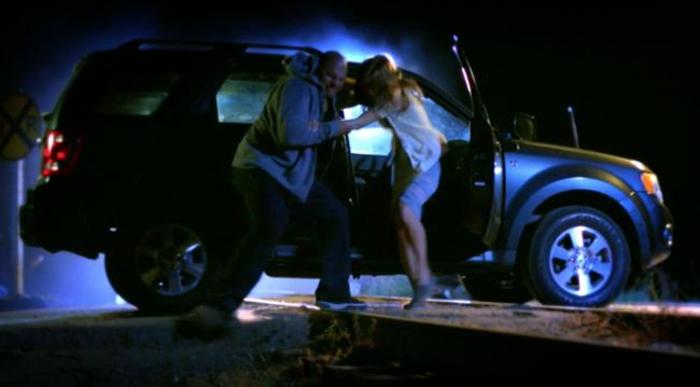
The screen goes dark and we’re thrown into the plot twist of the century: DIANA IS GAY!
The camera pans over conspicuous photos in her house, set in frames that say “Forever in love.”

Next to them is an open Bible with a particular passage highlighted and underlined:
Do you not know that the unrighteous will not inherit the kingdom of God? Do not be deceived. Neither fornicators, nor idolaters, nor adulterers, nor homosexuals, nor sodomites, nor thieves, nor covetous, nor drunkards, nor revilers, nor extortionists will inherit the kingdom of God. And such were some of you. But you were washed.
Now we hear Diana’s voicemail to Peter. She heard that God gave second chances. And she really could have used a second chance.
Flash to Diana in a hospital bed. She is alive. Her makeup is impeccable. Peter brings her flowers and they share a knowing smile.

We end with media coverage of the crash, which glorifies the man who saved Diana and frames her as an ungrateful wench. Prime quotes include:
“The victim refused to be rescued.”
“She just kept screaming at him and looking at him like he was evil.”
“She didn’t understand what he was trying to do. She thought he was trying to hurt her, but he was trying to save her.”
“She thought he was an enemy, but he turned out to be a friend.”
It’s almost as if someone twice your size screaming at you when you have no way to escape is threatening!
But no, it’s Diana’s fault for not immediately leaping into the scary man’s arms. Blame her for her bruises. End of movie. Cut to real-life resources on witnessing to homosexuals.
…
Clocking in at a little over 50 minutes, this film is a true work of hilarious nonsense. Some Christian movies of this nature make you weep for children who are clearly being abused, or leave you consumed with thoughts about extremists who are actively plotting your death. This is not one of those movies.
The target audience is not “homosexuals” seeking to repent, but supportive Christians who aren’t doing enough to marginalize and harass their LGBT friends and family. Peter says over and over that he loves gay people, that he doesn’t think they should be stoned, that he wants the best for them. Viewers are supposed to see themselves in him. But he also sends people Ray Comfort videos, so can we really trust him?
Now that I own it, I might watch this film again with a group of friends and turn it into a drinking game. And then I’ll revel in the fact that I can now get married in any state I want.
There were Christians from a nearby church handing out bottles of water to Pride attendees yesterday, and I gladly accepted the offering. Maybe that’s not Ray Comfort’s idea of Christianity, but it’s the one that’s winning.



It’s Moving Day for the Friendly ..."
It’s Moving Day for the Friendly ..."
It’s Moving Day for the Friendly ..."
It’s Moving Day for the Friendly ..."